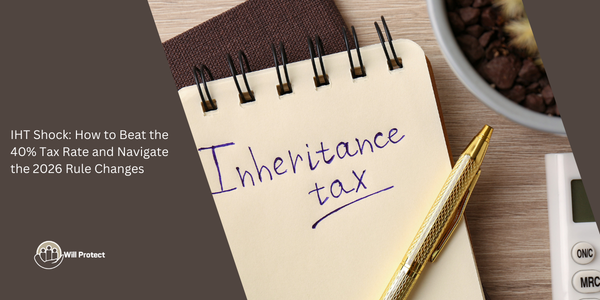Passing on Your Wealth in 2025: What Every UK Family Must Know
Estate planning in the UK is evolving at an unprecedented pace. Shifts in legislation, changes in taxation, and the growing importance of digital assets are reshaping how people prepare for the future. While making a will remains a cornerstone of safeguarding your estate, the process now involves much more than deciding who inherits your property.
Modern estate planning requires an understanding of complex tax rules, digital legacies, and the latest government reforms.
Below, we explore the key trends and challenges shaping estate planning and will-writing in 2025—and what you can do to protect your legacy.
Digital Assets and the Digital Property Bill
Our lives are increasingly digital, with personal and financial data spread across online accounts, social media profiles, and cryptocurrency wallets. These digital assets often have real monetary or sentimental value but can be difficult to access after death.
The Property (Digital Assets etc.) Bill is a landmark step in addressing this issue, giving digital assets legal recognition as property. Executors now have clearer rights and responsibilities when managing online accounts and digital wealth. Without proper planning, however, these assets risk being lost forever.
What you can do
- Keep a secure, regularly updated digital assets inventory listing all your important accounts.
- Appoint a digital executor to manage these accounts after you pass away.
- Use a Letter of Wishes or a password manager (not your will) to share access credentials, since wills become public documents during probate.
The Wills Act 2025 – A Legal Modernisation
The Law Commission’s proposed Wills Act 2025 aims to modernise a law that has remained largely unchanged for nearly 200 years. Key proposed reforms include:
- Recognising electronic wills, making the process more accessible and secure.
- Lowering the minimum age for creating a will from 18 to 16 years old.
- Ending the automatic revocation of a will upon marriage or civil partnership.
- Introducing stronger safeguards against undue influence and fraud.
These reforms are designed to bring the law in line with the way people live today, but they also raise concerns about ensuring authenticity and preventing online fraud. The introduction of tamper-proof technology and secure identity verification will be vital to the success of digital wills.
Government Policy and Tax Changes Impacting Estates
Government policy plays a central role in determining how much wealth families can pass on. In recent years, Inheritance Tax (IHT), Capital Gains Tax (CGT), and pension rules have undergone major shifts that significantly affect estate planning.
The most notable changes include:
- From April 2027, pension pots and death-in-service benefits—often previously exempt—will be included within IHT. This means families will face potential tax liabilities on pensions, adding complexity to probate and estate administration. The government expects this change to bring 1.5% more estates into IHT and raise an additional £1.5 billion annually by 2030.
- Capital Gains Tax (CGT) rates have risen, with non-property gains now taxed at 18% or 24% and carried interest taxed at 32%. The annual CGT exemption has also been cut drastically from £12,300 to just £3,000, reducing the tax-free buffer for asset disposals.
- Agricultural and business property relief will be tightened from April 2026, with full relief capped at £1 million and only 50% relief thereafter, which could significantly affect family farms and business owners.
- The IHT nil-rate band (£325,000) and the residence nil-rate band (£175,000) remain frozen despite rising property values. This “fiscal drag” is pulling more middle-class families into the IHT net.
These changes underline the importance of proactive planning. Strategies such as lifetime gifting, setting up trusts, or using life insurance policies placed in trust are increasingly popular as ways to mitigate tax burdens.
The Impact of Fiscal Drag on Inheritance Tax
Inheritance Tax receipts have risen sharply, with the Treasury collecting £2.22 billion in IHT in the first quarter of 2025 alone—a 6% increase compared to the same period last year. With tax thresholds frozen until at least 2028, rising house prices and asset values mean more estates will face tax bills.
To stay ahead of this trend, individuals should:
Will Disputes and Capacity Challenges
Will disputes are increasing in the UK, with over 10,000 disputes annually, often triggered by complex family situations or questions over the testator’s mental capacity. Conditions such as dementia are contributing to the rise in legal challenges.
To minimise the risk of disputes:
- Document your mental capacity at the time of making a will.
- Keep clear, written records of your intentions.
- Consider having your will professionally witnessed and, where appropriate, record the signing process.
DIY Wills and Online Platforms
DIY wills and online platforms are growing in popularity, particularly among younger adults who value convenience and fixed-fee services. As of 2025, 41% of UK adults now have a will, up from 38% last year.
While online services can be sufficient for simple estates, they can leave room for error in more complex cases. Incorrect wording, lack of legal formalities, or failure to plan for blended families can lead to costly disputes. Professional advice is recommended for estates involving significant assets, businesses, or international elements.
Digital Legacies and Modern Family Structures
Digital legacies—such as social media profiles, digital photo libraries, or online subscriptions—are becoming an integral part of estate planning. Around 39% of people now include digital instructions in their wills or Letters of Wishes.
Additionally, the rise of blended families, cohabiting couples, and unmarried partners means that intestacy laws no longer fit many modern households. Without a valid will, loved ones may be left without the inheritance you intend for them.
What Should You Do Now?
With so many changes in tax policy and estate planning laws, it’s more important than ever to review your arrangements regularly. Here’s what you can do today:
- Review your will every 2–3 years or after any significant life change.
- Plan for digital assets and appoint someone to manage them.
- Seek professional advice to navigate IHT and CGT changes.
- Document your wishes and capacity to reduce future disputes.
- Use trusts, gifts, and insurance policies to minimise tax liabilities.
And Finally…
Estate planning is now about much more than writing a basic will. With new government policies affecting inheritance tax, capital gains, and pensions, as well as the growing complexity of digital and family assets, proactive planning is essential.
By taking the time to review and update your plans now, you can protect your wealth, minimise tax liabilities, and ensure your loved ones are fully provided for.



